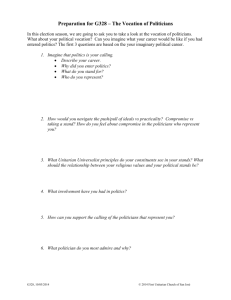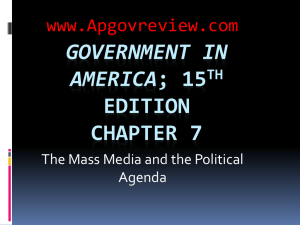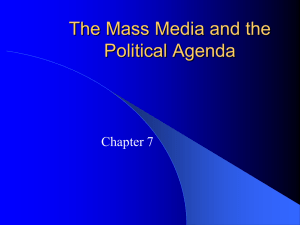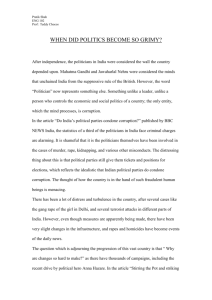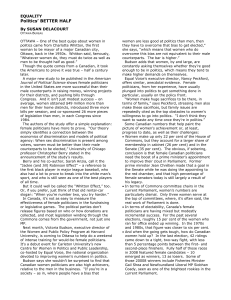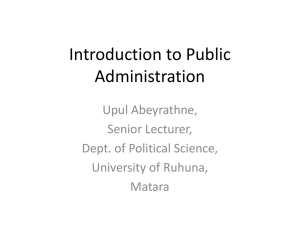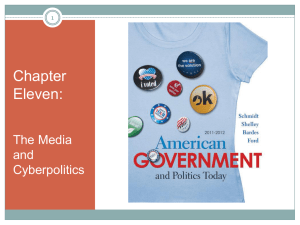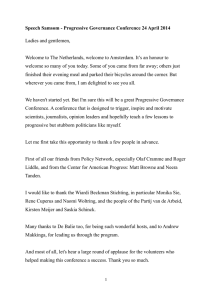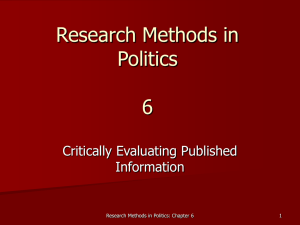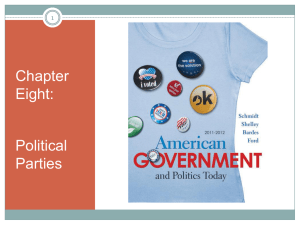Nick and Will`s slides - University of Southampton
advertisement
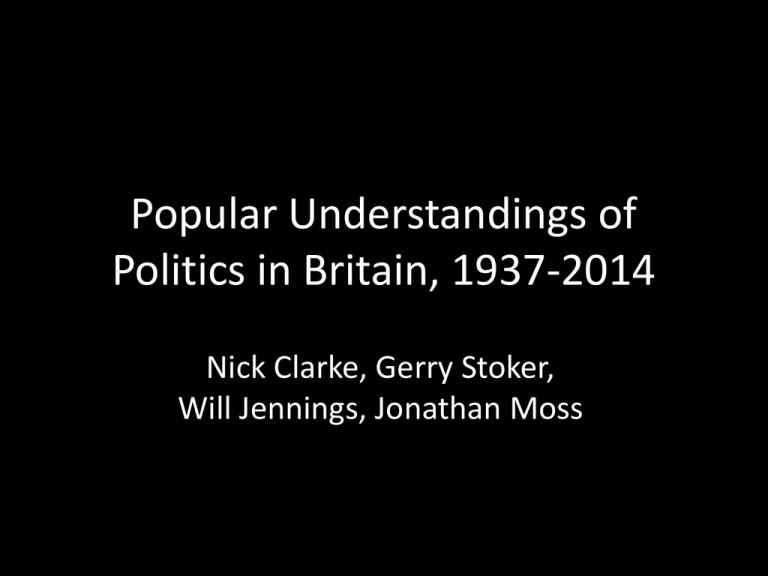
Popular Understandings of Politics in Britain, 1937-2014 Nick Clarke, Gerry Stoker, Will Jennings, Jonathan Moss Outline 1. 2. 3. 4. 5. Introduction – context, objectives, R design Stage 1 – polling data Stage 2 – material from Mass Observation Conclusion – dissemination plans Discussion 1. Introduction The project • A collaboration between Geography and Environment (G&E) and Politics and International Relations (PAIR) at the University of Southampton • Funded by the ESRC • October 2014 to March 2016 • Four investigators: – – – – Nick Clarke Gerry Stoker Will Jennings Jonathan Moss The context • Increasing withdrawal of political support from the institutions of formal politics in Britain and certain other countries since the 1960s • Hansard Society (2013): interest in formal politics, propensity to vote, and approval of the political system have all declined in Britain over the last decade • The causes for such disenchantment and disengagement are not clear – there are many hypotheses (Stoker 2014) but few conclusive results (e.g. Norris 2011) • Missing from existing research on this topic are two things: data for the period prior to 1960; and the voices of citizens Aims and objectives • Overall aim: to understand better what and how British citizens have thought about formal politics since the late 1930s • Objectives 1. To establish the range of popular understandings of politics among British citizens 2. To establish changes in prominence of certain popular understandings over time 3. To suggest causes for these changes Research design • Stage 1: analysis of quantitative data available from polling organisations (1937-2014) • Stage 2: analysis of qualitative data available from the Mass Observation Archive (1945-2014) • Stage 3: integration of findings from historical research with relevant contemporary research (e.g. Hansard Society 2012) 2. Stage 1 – polling data Stage 1 • Collection of historical aggregate poll data and survey questions, e.g. Gallup International Public Opinion Polls, Great Britain: 1937-1975, on public attitudes towards politics, parties and politicians. What sorts of questions are asked at different points in time (e.g. approval, trust, conduct)? • Collection of individual-level data from the BES (1964-2015), BSAS (1983-2014) and other datasets deposited in the UK Data Archive. Stage 1 • But potential for tracking longitudinal trends in public attitudes towards politics with quantitative data limited by historical repertoires of question wordings (and contemporary concerns). • Example of a creative solution: replication of Gallup question first asked in 1944 (and in 1972). • “Do you think that British politicians are out merely for themselves, for their party, or to do their best for their country?” Stage 1 50 48 40 38 36 35 30 30 % 28 22 22 20 12 10 0 12 10 7 1944 1972 Themselves • Their party 2014 Their country Don't know Source: YouGov, 2,103 GB Adults, Fieldwork: 20th - 21st October 2014 Stage 1 • Conservative voters are more positive: 34% think politicians out for themselves, 21% that they are out to do what is best for their country. • UKIP voters are most negative: 74% think that politicians are out for themselves, just 3% to do what is best for their country. • Implication: historical comparisons may also provide insights into current trends/patterns in popular attitudes towards politics. 3. Stage 2 – material from Mass Observation Stage 2 – data collection • Mass Observation – Est. 1937 – 1937-60: mass observers – 1937-65: panellists (day surveys, directive responses, diaries) – 1970: est. of Mass Observation Archive – 1981-present: Mass Observation Project • Eight relevant directives: – Pre-1960s: Feb/Mar 1945, May/Jun 1945, Nov 1945, Jul 1950, Nov 1950 – Post-1960s: Aut/Win 1996 combined with Spr 1997, Spr 2010, Spr 2014 – Responses per directive: 98-369 – Panel not formally representative but: it is more representative than is often assumed; we can sample within it; this is not essential Stage 2 – data analysis • Cognitive science and anthropology: people make sense of the world using shared cultural models or folk theories • Post-structuralism: common sense gets made and unmade through two discursive processes: the circulation by experts of cultural resources; interaction whereby people dispose themselves towards cultural resources in particular ways • Research questions: 1. 2. 3. 4. What is the range of popular understandings of politics among British citizens? On what shared cultural resources do such understandings draw? From what communicative interaction do such understandings emerge? How has all this changed over time? Stage 2 – Example questions • Feb/Mar 1945: What would you say is your normal conversational attitude when talk gets round to politicians? • Nov 1950: Give an account of the development of your feelings about politics and of your political outlook and sympathies. • Aut/Win 1996: Keep a diary in the run-up to the General Election. It should include your reactions to the political situation, the issues which are being debated, the media, the performance of politicians, your opinions of the campaigns, and your own involvement. • Spr 2010: The General Election 2010. What do you think? Are you excited by the possibilities of change or are you bored already? Are you actively involved in electioneering or will you let the whole thing pass you by? What does it mean to you? Stage 2 – Example responses Feb/Mar 1945: What would you say is your normal conversational attitude when talk gets round to politicians? • Female teacher, 48, Watford: ‘[…] Labour sympathisers seldom mention Tory politicians except when one of them says something particularly silly or startling […]. Conversations with Tories usually finish with the remark “politicians are only out for what they can get” or “politics is a dirty business” and they usually mean that socialists only want to make a living out of politics’. • Female teacher, 45, Burwash Weald: ‘[…] The weakness of politicians is that they follow the crowd (or votes) where they should take a risk, strike a higher note and lead. Party loyalty at the expense of principle is often overdone. Many dislike party politics and almost all think they are wrong. Hence politicians are thought to be dishonest and self-seeking because they disagree’. 4. Conclusion Plans for dissemination • • • • • Website: www.antipolitics.soton.ac.uk Conferences: PSA 2015; ECPR 2015; RGS-IBG 2015 Journal papers and book Executive summary of findings Impact events (early 2016): briefing for journalists (with the Hansard Society); workshop in London; TEDx style conference in Southampton 5. Discussion
